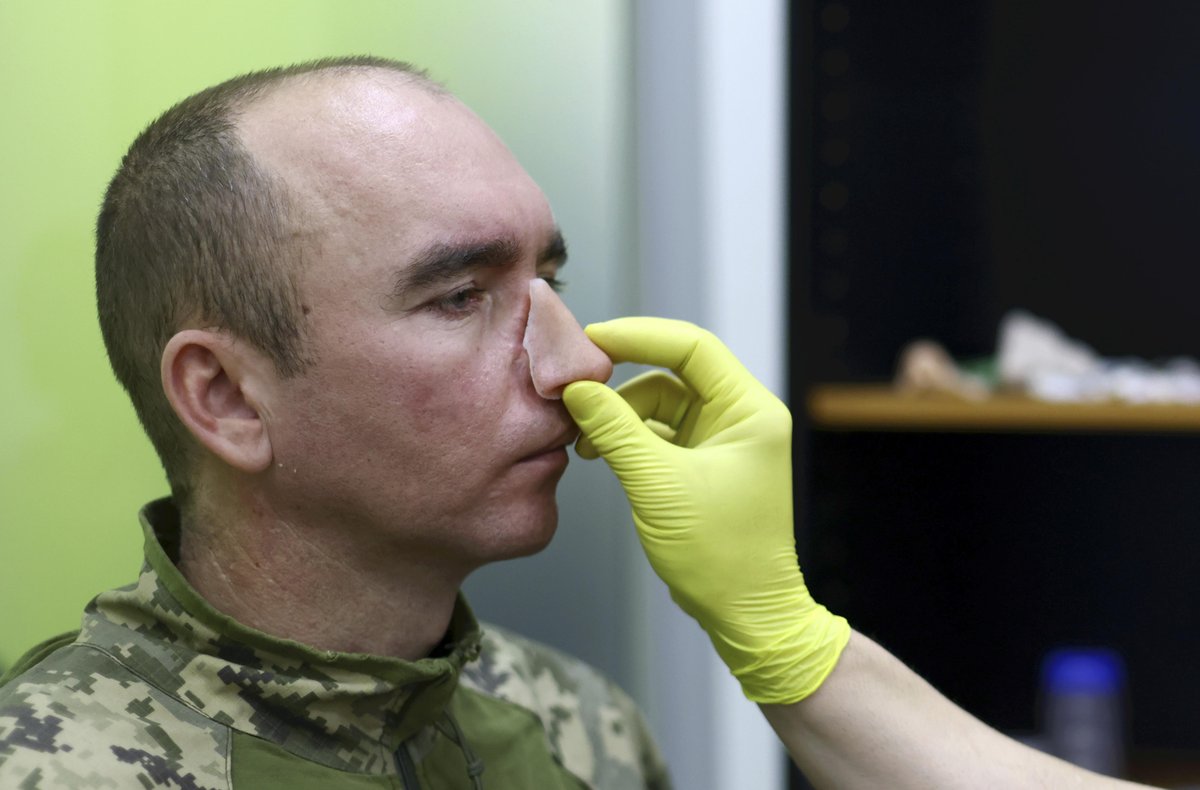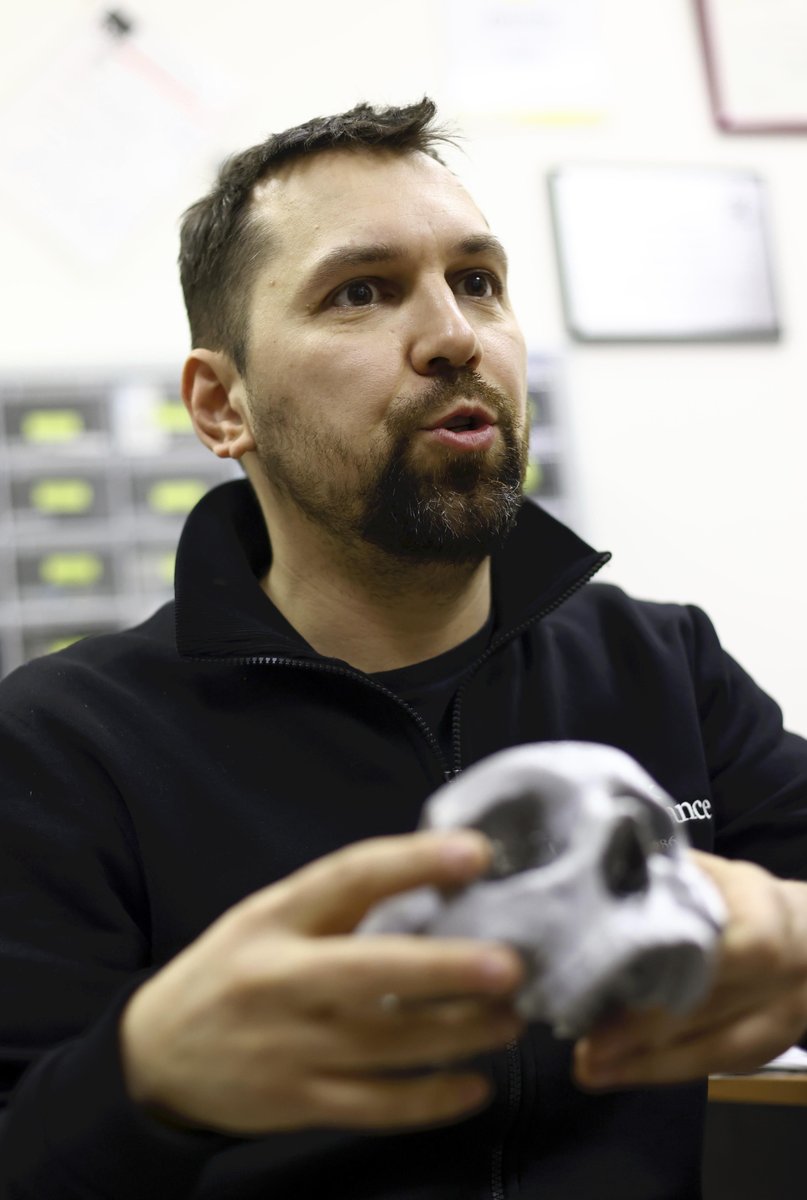Facial 3D Implants Helping Injured Ukrainian Soldiers Face Future; ‘Doctors for Heroes’ Project Aims for Social Rehabilitation

A doctor attaches an artificial nose to the face of former Ukrainian soldier Vadym Holovko in Kyiv on Feb. 10.
13:33 JST, February 25, 2025
KYIV — Former Ukrainian soldier Vadym Holovko in February 2024 was conducting military operations on the outskirts of the city of Bakhmut in eastern Ukraine’s Donetsk region when a Russian shell exploded nearby and tore off his nose. Holovko instantly knew he had lost his nose, but he fell deep into despair only after he had survived his near-death experience.
“I couldn’t accept the man I saw in the mirror,” Holovko told The Yomiuri Shimbun.
Holovko was discharged from the hospital the following month and returned to his home in Kyiv. However, he avoided going out in public. Holovko’s wife encouraged him by saying, “You’re alive and that’s all that matters.”
He wrapped bandages around his face to cover his disfigurement, but passersby often gave quizzical looks when they noticed how flat his face was.
“I felt like I was a clown,” Holovko recalled.
Three years have passed since Russia launched its aggression against Ukraine, and the social rehabilitation of soldiers injured on the front line, such as Holovko, is becoming an increasingly pressing issue. Many of the soldiers who suffered facial injuries feel alienated.
To help such soldiers return to a life in which they can “feel like a person again,” an organization called Doctors for Heroes is using cutting-edge technologies to make custom implants and reconstruct their faces. The organization has conducted more than 200 surgeries so far.
About 390,000 Ukrainian soldiers have been injured in combat with Russian forces. The extent of their injuries and the affected body parts vary, but wounds to the face and delicate areas can also leave deep internal scars.
Donations from across Ukraine
The Doctors for Heroes project to support wounded soldiers was established by Danylo Prykhodko, who runs a 3D printing company. While interacting with soldiers, Prykhodko came to a realization about serious facial injuries. “A face isn’t just about the external appearance,” explained Prykhodko. “It’s a matter of not losing who you are and whether you will be accepted by society.”
Before the Russian aggression in February 2022, Prykhodko’s company used 3D printers to produce mostly models and parts for construction projects. The company had only just started attempts to apply its technologies in the medical field. However, the attack turned this situation on its head. Prykhodko’s company was soon flooded by requests to help the treatment of soldiers injured in combat.

Danylo Prykhodko, who established a support project for injured Ukrainian soldiers, discusses his initiative during an interview in Kyiv on Feb. 10.
The face often suffers terrible injuries when it is not protected by a helmet. However, military hospitals give priority to lifesaving and emergency treatments, and they must deal with a constant influx of wounded people.
Prykhodko felt that these “heroes” who had fought to defend Ukraine should not have to hide themselves away. He started activities to provide comprehensive facial reconstruction free of charge to these soldiers so they could regain the ability to “smile, kiss and eat” — three things important to humans. Each implant costs an average of about 2,500 euros (about ¥400,000), and this is covered by donations collected mainly from within Ukraine.
Every person’s face is different, so there is no standard shape for facial reconstruction implants, unlike prosthetic legs, for instance. Injuries to various parts of the face can have an impact on other parts, so treatment can be complex and must proceed in a coordinated manner. The project has assembled 3D printing technicians and doctors who specialize in different facial parts, and the number of participating doctors has grown from 10 to 36.
Top Articles in World
-

Israeli Ambassador to Japan Speaks about Japan’s Role in the Reconstruction of Gaza
-

Videos Plagiarized, Reposted with False Subtitles Claiming ‘Ryukyu Belongs to China’; Anti-China False Information Also Posted in Japan
-

North Korea Possibly Launches Ballistic Missile
-

Chinese Embassy in Japan Reiterates Call for Chinese People to Refrain from Traveling to Japan; Call Comes in Wake of ¥400 Mil. Robbery
-

Russia: Visa Required for Visiting Graves in Northern Territories, Lifting of Sanctions Also Necessary
JN ACCESS RANKING
-

Japan PM Takaichi’s Cabinet Resigns en Masse
-

Japan Institute to Use Domestic Commercial Optical Lattice Clock to Set Japan Standard Time
-

Israeli Ambassador to Japan Speaks about Japan’s Role in the Reconstruction of Gaza
-

Man Infected with Measles Reportedly Dined at Restaurant in Tokyo Station
-

Videos Plagiarized, Reposted with False Subtitles Claiming ‘Ryukyu Belongs to China’; Anti-China False Information Also Posted in Japan






















